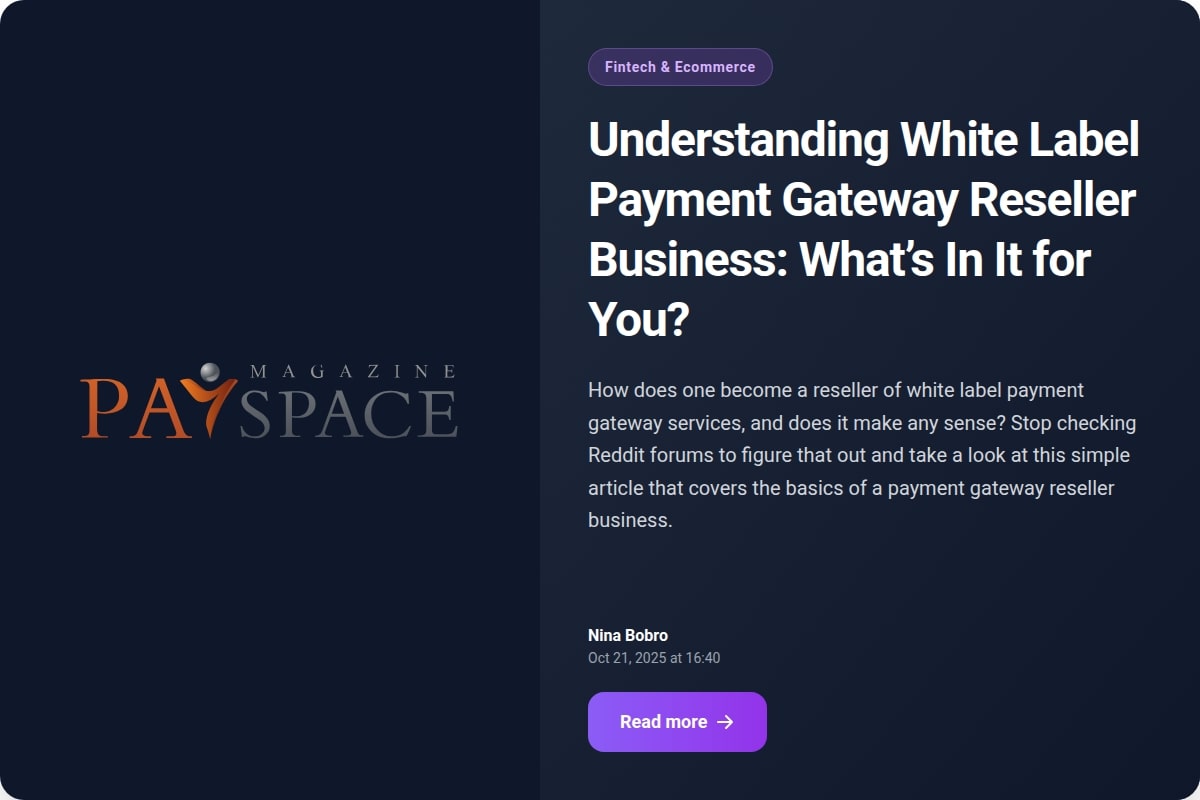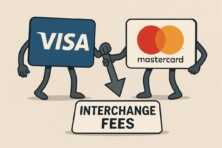How does one become a reseller of white label payment gateway services, and does it make any sense? Stop checking Reddit forums to figure that out and take a look at this simple article that covers the basics of a payment gateway reseller business.

What Is a White Label Payment Gateway?
At its core, a white label payment gateway is a ready-made payment infrastructure built by a payment software provider that another company can rebrand as its own. Instead of investing heavily in technology, licensing, and security compliance, you can offer a customisable payment solution that looks and feels entirely yours, but runs on a trusted backbone rail.
This way, white label partnerships allow acquirers, PSPs, and ISOs to accelerate their go-to-market without reinventing the wheel. The gateway handles core functions like transaction processing, security, and compliance, while resellers customize the interface, branding, and merchant experience. It’s a win-win: you focus on sales and customer relationships while leveraging enterprise-grade infrastructure behind the scenes.
How the White Label Payment Gateway Reseller Model Works
A white label payment gateway resellers, such as ISOs, SaaS platforms, and payment facilitators, act as a middle layer between the technology provider and the end merchants. Instead of promoting someone else’s payment platform, you rebrand it as your own and sell it to clients under your business identity.
Platforms that provide white-label payment gateway software often offer reseller programs that allow businesses to:
- Customize the payment page, dashboard, and merchant portal with their logo and colors.
- Manage merchant onboarding, pricing, and support.
- Earn recurring revenue from transaction fees and merchant accounts.
The provider remains responsible for hosting, PCI DSS compliance, and integrations, while you control customer acquisition and relationships. This structure lets you scale fast without the burden of maintaining a complex payment stack.
White Label Reseller vs. Affiliate: What’s the Difference?
These two terms often get mixed up, but they mean very different things.
- Reseller:
A reseller takes a white label payment gateway, rebrands it, and sells it as their own. They manage merchant onboarding, customer support, and pricing. Essentially, they own the customer relationship and earn from every transaction. - Affiliate:
An affiliate simply refers clients to the payment gateway provider through a referral link. Once the client signs up, the affiliate receives a one-time or recurring commission, but doesn’t control branding or customer experience.
Think of it this way: affiliates promote, while resellers build and manage the sales process.
If you want brand control and long-term income, becoming a reseller makes more sense.
At the same time, affiliates don’t need to handle merchant onboarding, compliance, or support. If you’re testing the market or building an audience before investing in a full reseller setup, an affiliate partnership is a simple entry point.
Another case when affiliate programs might be more to your advantage is if your strength lies in blogging, social media, or consulting rather than managing merchant accounts. Then, the affiliate route allows you to earn from referrals without dealing with the operational side of payments.
In short:
- Choose affiliate if you want to monetize referrals quickly and easily, with minimal setup.
- Choose reseller if you want to build a branded payment business and own the customer relationship.
How Much Can You Earn As a White-Label Payment Gateway Reseller or Affiliate
Besides the specifics of operating mode, many people are interested in financial gains that might be brought by reseller or affiliate models. Of course, there’s no one-size-fits-all figure for how much resellers or affiliates of white-label payment gateways can earn, because it depends a lot on variables such as processing volume, fee margins, pricing strategy, niche served, and your ability to scale.
For rough estimations, however, we can check typical payment ranges and payment structure examples, so you can assess what might be realistic for you.
Typical Earnings for Affiliates
Some affiliate programs pay a one-time flat fee or “pay-per-lead” rather than a share of transactions.
- E.g, Akurateco (a white-label payment gateway and orchestration platform provider) offers US$200 per “qualified lead” (i.e., a fintech/enterprise merchant lead) in their affiliate program.
Others pay as a percentage of the merchant’s transactions or revenue share, on a recurring (lifetime) basis. For example:
- Cashfree Payments (India) offers 0.25 % of each transaction for the standard UPI mode, up to ~0.35 % for other modes.
- Other programs may offer lifetime commission on every transaction processed by your referred merchants, which may reach about half of the processing fees paid by your referrals.
Typical Earnings for Resellers
Resellers operate at a higher level (you brand the gateway, onboard merchants, set pricing), so the upside is greater, but so is the responsibility and risk.
The reseller models differ as well. Depending on the case, resellers can earn up to 50% of the profit margin generated by the merchants they refer. That can range anywhere from $500 per month to $12,500 per month.
To earn a sustainable income, you need to onboard multiple merchants, manage pricing and relations, support them, and keep volume consistently high.
How to Become a White Label Payment Gateway Reseller
You don’t need to be a tech company to get started, but you do need a plan. Here’s how it usually works:
- Partner with a reliable provider.
Choose a reliable platform that offers white label programs with strong support and documentation. The choice ranges from regional fintech leaders to global payment behemoths like Mastercard. - Customize your branding.
Design your logo, color scheme, and merchant portal to match your company’s identity. - Set your pricing and target market.
Decide whether you’ll focus on small businesses, e-commerce merchants, or niche sectors like nonprofits or churches. - Handle compliance and onboarding.
Your provider manages most compliance aspects, but you’ll still need to ensure KYC and merchant verification align with regulations. - Launch and scale.
Market your gateway, build merchant relationships, and continuously improve your customer support.
Why It Makes Sense in 2025
The global payments ecosystem continues to grow rapidly, driven by digital commerce, embedded finance, and mobile wallets. According to industry research, businesses increasingly want custom payment experiences, not one-size-fits-all gateways.
White label payment gateway resellers are uniquely positioned to meet this demand. They combine flexibility, speed to market, and recurring revenue opportunities. And for specialized markets like churches and nonprofits that accept donations rather than typical e-commerce transactions, white labeling provides the customization and trust that generic payment providers can’t match.
If the white label payment gateway reseller model seems too challenging, if you’re starting out and don’t yet have merchant relationships, or you want low risk, an affiliate might be a simpler but similar path. Though earnings might start small, they can also scale with effort.










